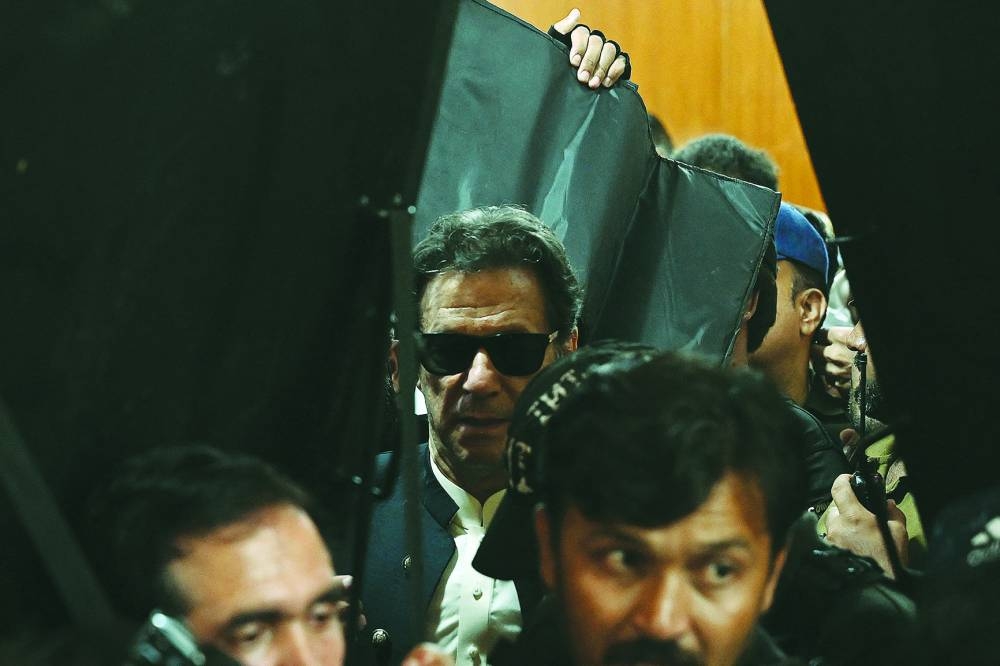Former Pakistan prime minister Imran Khan has refused police permission to search his Lahore home for suspects involved in this month’s attacks on state and army buildings and laid out his own terms for any such operation.
Khan has denied sheltering anyone involved in the violence and said that a search could only be conducted by a panel set up by a high court, with members from both the government and his party – and on the condition that a female officer accompanies them.
“They first said that there were terrorists (inside), but then they said that there were wanted men,” Khan told reporters.
“I asked them, they could come and see inside if there were wanted men, but they said they wanted to search my home, which I couldn’t allow,” he said. “If they have to search, it will be under a court order, like it said earlier, that there will be persons from both sides with a woman included.”
He said he feared police, unsupervised, could plant weapons.
Amir Mir, information minister of the province of Punjab, of which Lahore is the capital, earlier told Reuters that police would only start a search after agreeing on conditions with Khan.
The standoff is the latest in a tussle between former cricket star Khan, 70, and the powerful military that has deepened political instability in the South Asian nation of 220mn.
Pakistan also faces its worst economic crisis in decades, with critical International Monetary Fund (IMF) funding needed to avert a balance of payment crisis delayed for months.
Khan’s home is in the Zaman Park neighbourhood of Lahore and was the site of pitched battles in March between his supporters and police who had tried to arrest Khan for not showing up in court.
Khan was eventually arrested on May 9 on graft charges, which he denies, and released on bail that expires this month.
His arrest triggered a wave of violence by supporters who attacked government buildings, public properties and military installations, including its headquarters and the house of a military commander in Lahore.
Mir said that there are no plans to rearrest Khan.
Lahore police chief Bilal Kamyana said police had arrested 14 suspects involved in the attack on the commander’s house as they tried to escape Zaman Park.
A government statement said the team handed over all the evidence about the suspects to the administration of Zaman Park.
It said a list of 2,200 suspects involved in the violence was also handed over to Khan.
Analysts said a search of Khan’s house could trigger further unrest.
On Thursday, Khan’s aide, Iftikhr Durrani, allowed journalists into some areas of the home to “look for terrorists”.
Mir said they were given very limited access and could not account for the whole property.
Khan said he is worried what police would do if allowed to search his home without a court order.
“We fear that they will do what they did earlier – they stormed my home in my absence and said that they found weapons.”
The former prime minister meanwhile said that he has had “no dialogue” with Pakistan’s military since his campaign of defiance against the nation’s powerful generals boiled over into deadly unrest last week.
The opposition leader’s comments in an interview with AFP underscore the full-scale breakdown of relations between the country’s most popular politician and the army, which directly ruled Pakistan for more than three decades and remains hugely powerful behind the scenes.
“The current army chief clearly has some problems with me,” Khan said inside his Lahore home late on Thursday. “I don’t know what will happen in the future, but right now there’s no dialogue.”
He said the government led by Prime Minister Shehbaz Sharif is “scared” to face his Pakistan Tehreek-e-Insaf (PTI) party in general elections due no later than October.
“Our party has been facing a crackdown really for one year,” said Khan, seeming tired but resolved, sitting between the twin draped flags of Pakistan and the PTI. “I was removed from power through this conspiracy by the ex-army chief.”
Military support has historically been a cornerstone of stable governments in Islamabad, although the institution denies involvement in politics.
The growing chasm between Khan and the generals complicates his campaign to return to office and pits his legions of followers against those in control of the world’s sixth-largest army.
Despite the rhetoric, Khan says he is open to negotiations.
“Believe me, there is no issue from my side,” he said. “The fact is, no one wants to fight with your own army.”

Security personnel with ballistic shields escort former prime minister Imran Khan as he leaves after appearing on Friday at the High Court in Lahore.
